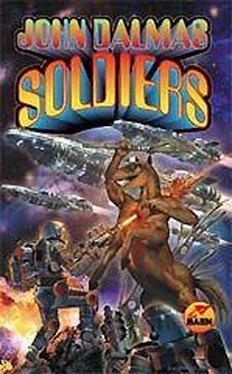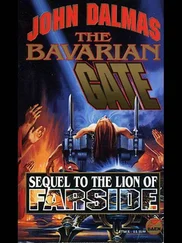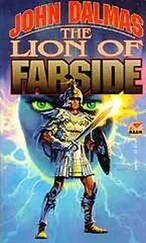John Dalmas - Soldiers
Здесь есть возможность читать онлайн «John Dalmas - Soldiers» весь текст электронной книги совершенно бесплатно (целиком полную версию без сокращений). В некоторых случаях можно слушать аудио, скачать через торрент в формате fb2 и присутствует краткое содержание. Жанр: Космическая фантастика, на английском языке. Описание произведения, (предисловие) а так же отзывы посетителей доступны на портале библиотеки ЛибКат.
- Название:Soldiers
- Автор:
- Жанр:
- Год:неизвестен
- ISBN:нет данных
- Рейтинг книги:3 / 5. Голосов: 1
-
Избранное:Добавить в избранное
- Отзывы:
-
Ваша оценка:
- 60
- 1
- 2
- 3
- 4
- 5
Soldiers: краткое содержание, описание и аннотация
Предлагаем к чтению аннотацию, описание, краткое содержание или предисловие (зависит от того, что написал сам автор книги «Soldiers»). Если вы не нашли необходимую информацию о книге — напишите в комментариях, мы постараемся отыскать её.
Soldiers — читать онлайн бесплатно полную книгу (весь текст) целиком
Ниже представлен текст книги, разбитый по страницам. Система сохранения места последней прочитанной страницы, позволяет с удобством читать онлайн бесплатно книгу «Soldiers», без необходимости каждый раз заново искать на чём Вы остановились. Поставьте закладку, и сможете в любой момент перейти на страницу, на которой закончили чтение.
Интервал:
Закладка:
The Commo fleet didn't get to the Aasen System. The armada had reached Maitreya's World earlier than expected, and might arrive at Aasen before the Commos were ready. Which would put the fleet at a needless and severe disadvantage. En route in hyperspace, simdrills would groove them all on Charley's revised program. But officers, crews, and Charley himself needed to follow the simdrills with adequate steel drills. So the Commos emerged in the fringe of the Shakti System. And there they waited, drilling until the Commos were fully confident of their skills, and even their fleet admiral was reasonably satisfied with their performance.
If my Commos had half-even a third-of the Wyzhnyny firepower, Soong thought, we'd win. Unfortunately they had nowhere near that. But then, he reminded himself, they didn't need to win if they did well enough, then escaped with losses that weren't too severe.
When the klaxons sounded, and shipsvoice called, "Battle stations! Battle stations! Battle stations!" the tension generated was more anticipation than fear. Alvaro Soong had already suppressed his misgivings, and his fleet was as ready as it could be. The Tao would favor him or not.
Aboard the Meadowlands, the alarm was a six-second blast of raucous horns, scant seconds after emergence. This time the grand admiral was on the bridge, not in bed. A human fleet lay in the same octant of the local system as his own, but an hour's warp jump insystem. An hour.
This time, he told himself, the humans would not strike him by surprise. His warfleet had re-formed its formations only 11.38 hyperspace hours outsystem; they could be tightened quickly. "Shipsmind," he said calmly, "order all battle wings to generate warpspace on my count. We will move outsystem far enough to satisfy the parameters of Plan 1.3, then initiate Phase A. One minute and counting: ninety… eighty…"
On zero his warfleet winked out of F-space.
Charley Gordon was on the bridge, his cart secured at the battle master's station. Alvaro Soong sat on his command seat, his hands resting loosely on its command board. For the moment his curved display screen was unsegmented, and inactive except for small analog and digital system displays.
Charley had predicted the Wyzhnyny would generate warpspace, move farther outsystem, and set ambushes before emerging. In warpspace, ambushes usually weren't very practical, but facing Wyzhnyny numbers, the risk was substantial. So the Commos would stay put. He predicted the Wyzhnyny would then make a warp jump back insystem, and attack simultaneously from multiple surrounding points. He intended to meet them aggressively. His cool confidence had infected all the bridge watch, including his admiral, whose stoicism just now approached tranquility.
They waited, Charley in a trancelike calm, poised, alert, perfectly ready; a state in which durations registered with no sense of waiting. On his orders, shipsmind provided music chosen to calm without dulling. It began with Gustav Holst's Planets Suite, thence to Colin Jokisaari's Uusisuomi Spring, and others. After a while, a messman brought a lunch cart, and the bridge watch ate at their stations. All but Charley, who never ate and didn't seem to miss it.
Soong wondered how someone could get over wanting to eat. He'd always assumed it was hardwired.
Grand Admiral Quanshuk had emerged in his new, more distant location. Time passed, enough that electromagnetic evidence, poking along at 186,000 miles per second, had informed the human fleet where he now was. Then more time, enough to tell Quanshuk that the humans would not be baited. They were leaving the offensive to him. Clearly this human fleet had a different commander than he'd dueled with before.
"Very well," he muttered. "We'll give them more than they'll like." He spoke his next order with a feeling approaching confidence.
It was late in the following watch, midway through Aleksandr Borodin's In the Steppes of Central Asia, that klaxons clamored aboard the Altai, cutting off the music. Shipsvoice's strident "Battle Stations! Battle Stations!" was redundant. Officers and ranks were already there. Charley Gordon's Situation One was unfolding.
Twelve mighty wings of Wyzhnyny warcraft had emerged on the fringe of Soong's fleet. Beyond them, on a larger perimeter, were twenty-four more. Outsystem a hundred million miles, the armada's transports and support craft had entered the relative security of warpspace.
The Wyzhnyny wings were differently constituted than the Commo wings, but comparable in power, and there were far more of them. They began their attack at once, accelerating in gravdrive, generating shields as they came. The Commo wings in turn started toward the Wyzhnyny. The maces led, accelerating much faster than humans or Wyzhnyny could survive. In brief seconds they reached the maximum speed at which they could carry out the intended evasion maneuvers. Then, by triplicate triads-threes of threes-they directed coordinated beam fire at selected Wyzhnyny battleships. While following evasion courses designed to confound target locks.
Quanshuk stared, chagrined. He'd learned before, the hard way, that certain human cruisers-presumably robots-could maneuver at high speeds. But he'd overlooked the acceleration potentials that implied. Nor had they previously shown him coordinated maneuvers on so large a scale.
His own ships responded promptly with both war beams and torpedoes, the action swift and violent, with too many craft over too large a volume of space for organics to follow the action. But the battlecomps on both sides took it all in, reacting with a quickness far beyond human or Wyzhnyny. Shields shimmered beneath the onslaught of war beams, flared and collapsed from multiple torpedo strikes. Hulls incandesced, exploded.
Then the surviving maces were through the Wyzhnyny formations. The Commo battle groups followed, their battleships wielding heavy beamguns. Firing torpedoes required complex shield topologies that made them more susceptible to destruction, so it was their corvette and cruiser outriders that wielded torpedoes. The smaller ships' safety lay partly in numbers, and partly in the Wyzhnyny tactic of focusing on human battleships.
Concentrating on battleships was a sound strategy for both sides. The Commos needed to destroy as many Wyzhnyny as possible, which meant maintaining fighting contact as long as they could-before the Wyzhnyny could gang up on them. Inevitably they did gang up on some of them, of course. The trick then became to disrupt the Wyzhnyny teamwork by throwing in maces. But meanwhile Commo ships were lost.
With the Wyzhnyny concentrating on the manned wings, the maces dropped their shields, generated warpspace, and disappeared. Their battlecomps had their orders and knew the drill. So far their losses had been modest, and they'd disordered the Wyzhnyny formations, disrupting their larger-scale coordination before the Commo battle groups struck. More ships died then, mostly Wyzhnyny, while the Wyzhnyny battle groups coordinated their fire as best they could.
From the bridge of the battleship Pyrenees, Axel Tisza saw the Altai caught in a crossfire from three Wyzhnyny battleships, her shield shimmering strongly with intercepted energy; her shield generator would soon overload. With a quick touch he turned two war beams on one of the attackers; another touch simultaneously ordered torpedoes engaged. Automatically his shield reconfigured, the torpedoes fixing on targets, and launching. A moment later a salvo struck the Pyrenees, and her outer shield layer collapsed. On the bridge, the lights flickered. Systems display windows showed generator status red and pulsing. Damage Control cut off the war beam, lessening the stress on the matric tap, in order to regenerate the shield layer. But there was too little time; another salvo struck, and almost simultaneously another. The lights flared and died, returning almost instantly as the emergency backup system responded. Klaxons clamored briefly before two more salvos struck, and the Pyrenees died. Axel Tisza hadn't even had time to see if he'd succeeded in saving the Altai and Charley Gordon.
Читать дальшеИнтервал:
Закладка:
Похожие книги на «Soldiers»
Представляем Вашему вниманию похожие книги на «Soldiers» списком для выбора. Мы отобрали схожую по названию и смыслу литературу в надежде предоставить читателям больше вариантов отыскать новые, интересные, ещё непрочитанные произведения.
Обсуждение, отзывы о книге «Soldiers» и просто собственные мнения читателей. Оставьте ваши комментарии, напишите, что Вы думаете о произведении, его смысле или главных героях. Укажите что конкретно понравилось, а что нет, и почему Вы так считаете.








